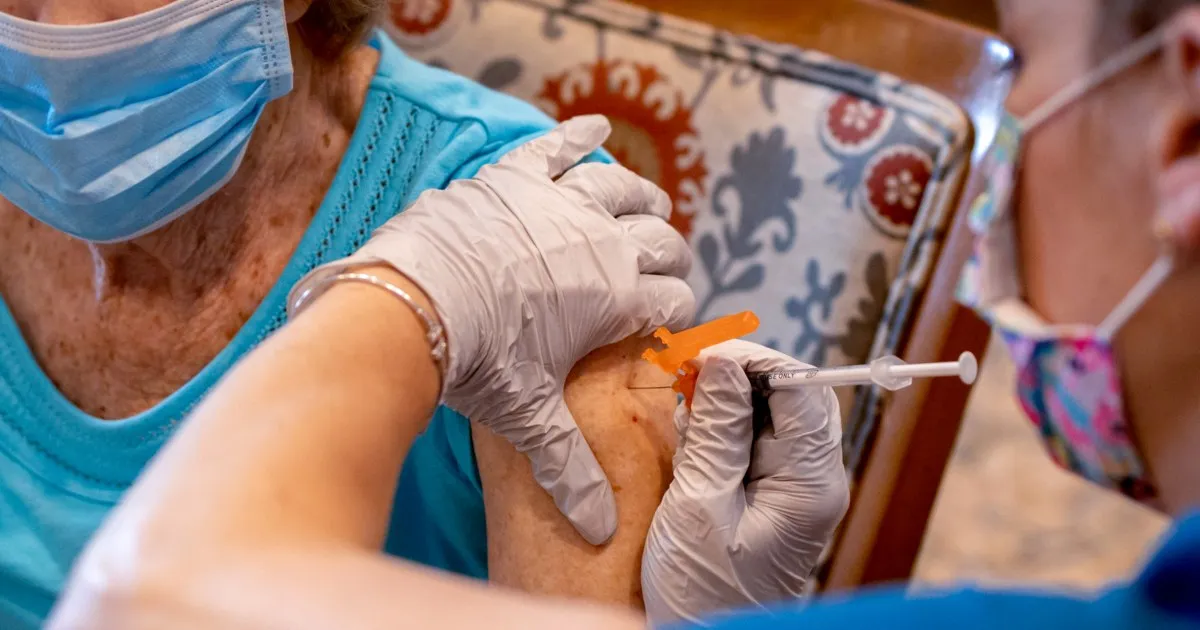
Many older Americans who rely on Medicare are currently grappling with an unforeseen challenge regarding the newly approved Covid vaccines. Last month, the Food and Drug Administration (FDA) granted approval for updated Covid shots for all adults aged 65 and older. However, many Medicare beneficiaries are discovering that these vaccines are not being covered, forcing them to make difficult decisions about out-of-pocket expenses.
Allison Engel, a 74-year-old resident of Pasadena, California, recently visited her local CVS pharmacy and was shocked to learn that the Covid shot would cost her $225 if paid out of pocket. Engel recounted, “They typed everything in and handed me a rejection letter. They told me it wasn’t in the Medicare system yet, and I should come back in two weeks.” Unwilling to wait, Engel opted to pay for the shot herself, hoping to secure reimbursement from Medicare later.
Similarly, Brant Mittler, 78, from San Antonio, Texas, faced a comparable situation at CVS. He noted that the pharmacist informed his wife, “We’ve had Medicare patients coming in all day, and everybody’s upset because we can’t give it.” Fortunately, Mittler and his wife were able to receive their Covid shots later that week after learning that Medicare had updated its system at their pharmacy.
These experiences contrast sharply with statements made by Health Secretary Robert F. Kennedy Jr., who testified before a Senate committee that most Americans would be able to receive a Covid shot from their pharmacy at no cost. As the Secretary of Health and Human Services (HHS), Kennedy oversees Medicare and previously announced that the FDA approved updated Covid shots primarily for a smaller, high-risk group, which includes individuals aged 65 and older and those with underlying health conditions. Concerns have been raised about access for those outside these high-risk categories, but Kennedy maintains that “anybody can get the booster,” assuring that most Americans can receive it at their local pharmacy.
Arthur Caplan, the head of the division of medical ethics at NYU Langone Medical Center, expressed his worries regarding the accessibility of vaccines amid changing policies from Kennedy. Caplan stated, “Medicare should be covering the shots, but it isn’t clearing people. This stirs up uncertainty about eligibility and whether individuals fall within the risk group.” Many eligible patients remain unclear about their access to the updated Covid shots.
Updated Covid shots began arriving at major pharmacy chains last week. However, some pharmacies are delaying their availability in certain states until the CDC’s Advisory Committee on Immunization Practices (ACIP) issues recommendations on eligibility. Notably, the ACIP typically convenes earlier in the summer to provide guidance on Covid vaccine recommendations, but this year’s meeting is not scheduled until September 18.
Despite this delay, Medicare does not require CDC approval to cover vaccines. Dorit Reiss, a vaccine policy expert at the University of California, San Francisco, explained that once the FDA approves a vaccine, Medicare has the authority to cover it. CVS, one of the largest pharmacy chains in the nation, has stated that in 13 states and Washington, D.C., Medicare patients will need a doctor’s prescription until ACIP offers its recommendations. In three states—Massachusetts, Nevada, and New Mexico—CVS will not provide the Covid shot until ACIP acts.
A CVS spokesperson, Amy Thibault, acknowledged that some payers are still updating their systems and may not be prepared to cover the updated Covid-19 vaccines. “If this happens, our pharmacy teams can help patients schedule an appointment for a later date,” Thibault added. Walgreens has not yet responded to inquiries regarding this issue.
A representative from the Centers for Medicare and Medicaid Services (CMS) indicated that the agency is actively monitoring the developments related to Covid-19 vaccines, stating, “CMS continues to monitor developments related to COVID-19 vaccines.”
As the landscape of Covid vaccinations continues to evolve, many older Americans are left navigating the complexities of coverage, eligibility, and access, raising questions about the effectiveness of current healthcare policies in supporting vulnerable populations.